I've used following commands to generate private and public ES256 keys:
Create private key: openssl ecparam -genkey -name prime256v1 -noout -out private.pem
Create public key: openssl ec -in private.pem -pubout -out public.pem
Now I got following private key:
-----BEGIN EC PRIVATE KEY----- MHcCAQEEIFkxqdXoVAGSSc55u0muepwVRr3ARWzLMO0ywW7qhEeIoAoGCCqGSM49 AwEHoUQDQgAEFXuuZeDJN9dvjCwKy40/coi3NVto97qELhiRSObbhX3mUSvxpPeK fVv3/fVCjt9CeGuwYvkQPHmRfx0EFjAI8A== -----END EC PRIVATE KEY-----
And following public key:
-----BEGIN PUBLIC KEY----- MFkwEwYHKoZIzj0CAQYIKoZIzj0DAQcDQgAEFXuuZeDJN9dvjCwKy40/coi3NVto 97qELhiRSObbhX3mUSvxpPeKfVv3/fVCjt9CeGuwYvkQPHmRfx0EFjAI8A== -----END PUBLIC KEY-----
I want to load these keys into ecdsa instance in c#. I do that with following code:
public ECDsaSecurityKey LoadPrivateKey()
{
byte[] privateKey = Convert.FromBase64String(PRIVATE_KEY);
try
{
ECDsa? privateKeyEcDsa = ECDsa.Create();
if (privateKeyEcDsa == null)
{
throw new CryptographicException(message: "Key not created");
}
privateKeyEcDsa.ImportPkcs8PrivateKey(source: privateKey, bytesRead: out _);
return new ECDsaSecurityKey(privateKeyEcDsa);
}
catch (CryptographicException exception)
{
throw;
}
}
And public key:
public ECDsaSecurityKey LoadPublicKey()
{
byte[] publicKey = Convert.FromBase64String(PUBLIC_KEY);
try
{
ECDsa? publicKeyEcDsa = ECDsa.Create();
if (publicKeyEcDsa == null)
{
throw new CryptographicException(message: "Key not created");
}
publicKeyEcDsa.ImportSubjectPublicKeyInfo(source: publicKey, bytesRead: out _);
return new ECDsaSecurityKey(publicKeyEcDsa);
}
catch (CryptographicException exception)
{
this._logger.LogError("Something went wrong while loading EcDsa public key: " + exception.Message);
throw;
}
}
When I run unit test, thing doesn't work, throws an error:

I am not sure why is this not working? Is the openssl command generating correct keypair type?
EDIT: On this website when I select ES256 private key is different: https://kjur.github.io/jsjws/tool_jwt.html
Example:
-----BEGIN PRIVATE KEY----- MIGHAgEAMBMGByqGSM49AgEGCCqGSM49AwEHBG0wawIBAQQgEbVzfPnZPxfAyxqE ZV05laAoJAl+/6Xt2O4mOB611sOhRANCAASgFTKjwJAAU95g++/vzKWHkzAVmNMI tB5vTjZOOIwnEb70MsWZFIyUFD1P9Gwstz4+akHX7vI8BH6hHmBmfeQl -----END PRIVATE KEY-----
And my private key generated with OpenSSL add two equals in the end:
-----BEGIN EC PRIVATE KEY----- MHcCAQEEIFkxqdXoVAGSSc55u0muepwVRr3ARWzLMO0ywW7qhEeIoAoGCCqGSM49 AwEHoUQDQgAEFXuuZeDJN9dvjCwKy40/coi3NVto97qELhiRSObbhX3mUSvxpPeK fVv3/fVCjt9CeGuwYvkQPHmRfx0EFjAI8A== -----END EC PRIVATE KEY-----
So I guess I am doing something wrong with open ssl.